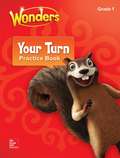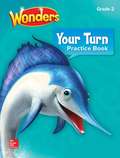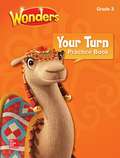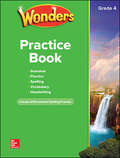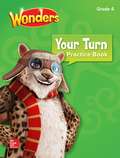- Table View
- List View
Wonders [Grade K], Reading/Writing Companion, Unit 3
by McGraw-Hill EducationNIMAC-sourced textbook
Wonders [Grade K], Reading/Writing Companion, Unit 4
by McGraw-Hill EducationNIMAC-sourced textbook
Wonders [Grade K], Reading/Writing Companion, Unit 5
by McGraw-Hill EducationNIMAC-sourced textbook
Wonders for English Learners Language Development Practice: English Language Development, Grade K-1
by Mcgraw-Hill EducationNIMAC-sourced textbook
Wonders, [Grade 5], Unit 1, ELD Companion Worktext, [Emerging]
by Jana Echevarria Josefina V. Tinajero Diane AugustNIMAC-sourced textbook
Wonders, Grade 1, Your Turn: Practice Book
by Mcgraw-Hill Education Donald BearNIMAC-sourced textbook
Wonders, Grade 2, Progress Monitoring Assessments
by McGraw-Hill EducationNIMAC-sourced textbook <P><P>Weekly “fresh reads” offer students the opportunity to demonstrate mastery of weekly skills, and help teachers evaluate and monitor progress.
Wonders, Grade 2, Your Turn: Practice Book
by Mcgraw-Hill Education Donald BearProvides students with their first guided practice, with fresh reading selections every week. Students can underline, circle, and highlight text to support answers with text evidence.
Wonders, Grade 3, Progress Monitoring Assessments
by McGraw-Hill EducationNIMAC-sourced textbook <P><P>Weekly “fresh reads” offer students the opportunity to demonstrate mastery of weekly skills, and help teachers evaluate and monitor progress.
Wonders, Grade 3, Unit Assessments
by McGraw-Hill EducationNIMAC-sourced textbook <P><P>Ensure valid assessment of student performance and progress, aligned to standards and measured against grade- level rigor. They are comprised of shorter foundational skills assessments and comprehensive assessments.
Wonders, Grade 4, Practice Book
by McGraw-Hill EducationNIMAC-sourced textbook <P><P>Blackline masters that provide multiple opportunities for students to master skills and strategies. The Practice Book features phonological awareness, phonemic awareness, phonics, spelling, handwriting, high-frequency words, category words, and grammar practice for each week of instruction, plus take-home stories.
Wonders, Grade 4, Progress Monitoring Assessments
by McGraw-Hill EducationNIMAC-sourced textbook <P><P>Weekly “fresh reads” offer students the opportunity to demonstrate mastery of weekly skills, and help teachers evaluate and monitor progress.


